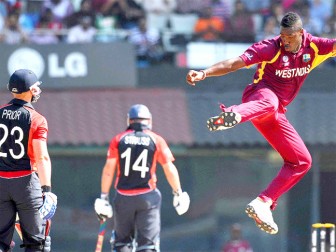By Tony Cozier
At the ICC World Cup
In CHENNAI
Once again, they could glimpse the beguiling beauty of victory. Once again, they became so petrified the closer they got to actually embracing it that they eventually turned and ran away.
It is a defect that has become so embedded in the psyche of West Indies teams that every loss, such as the latest against England here Friday night, simply fortifies it.

Repeatedly during a riveting, often bizarre, contest between two inconsistent teams on an unexpectedly true pitch, the West Indies retrieved difficult situations through a mixture of bold choices, creative tactics and disciplined cricket.
Yet, when most needed, their nerve deserted them.
They arrested an express England beginning to peg them back to 156 for the loss of the top six in the order after which their intensity dropped. They became ragged with their bowling and fielding so they found themselves having to chase 20 or so more than they should have.
After a typically topsy-turvy response, they were within 22 of their goal with two batsmen set in a partnership of 72, four wickets in hand and 8.4 overs remaining.
Again, they trembled when confronted with the reality that the match was theirs for the taking. The four wickets tumbled for three runs from 26 balls, triggering wild England scenes on the field for this was the result they had to achieve to stay in the tournament.
Ottis Gibson had dreaded such a situation. He has experienced it more than once in his brief stint as head coach and referred to it before the match.
He repeated it afterwards by implicitly informing his
players the example they need to follow.
“England have been a resilient side for a long time,” he said, speaking from the experience as their bowling coach prior to taking up his West Indies’ post.

“They don’t always play their best game, but somebody stands up…They have got the resilience that we are looking for.”
Even in defeat, there were individual “positives” to be gleaned for the West
Indies, such as the performances of Andre Russell (with his four wickets and, not least, his classy batting) and leg-spinner Davendra Bishoo.
Significantly, they are the two newest members of the team. Gibson’s task is to ensure that they and other recent recruits are not overcome by the defeatism that has so consumed the team for so long.
Like his several predecessors, he would have quickly come to appreciate that such mental, rather than technical, weakness is the main reason for the West Indies’ lowly position in a game for which they once set the standards.
There were decisions on Friday, off and on the field, that could be open to question. But it was not the omission of Shivnarine Chanderpaul, their most experienced, most dependable but, on form, not presently their best batsman, not the timing of some bowling changes, not Ramnaresh Sarwan’s inconvenient call of nature that sent Devon Thomas ahead of him in the order that cost the match.
Indeed, most of the strategies, unconventional as they appeared, worked.
Bishoo’s introduction for his international debut in such a critical match was a bold choice over the more conventional retention of Nikita Miller. Bishoo proceeded to deliver his leg-spin with the variation and control of a veteran, claiming three critical wickets. And he was a spark in the field.
Captain Darren Sammy’s decision to take it on himself to come one down in order to maintain Chris Gayle’s early impetus was gutsy. Failure would have added fuel to the rising public pressure over whether he merits his place in the team.
Instead, his belligerent 49 off 41 balls achieved its purpose.
With England blazing along at 94 for two after 15 overs, Jonathan Trott already 37 off 20 balls with seven fours, Sammy threw Bishoo into the firing line for the first time and offered him a slip as encouragement.
More cagey captains could have held him back for a calmer period. Not only did Bishoo check the rate, he despatched Trott with the last ball of his fourth over.
Where the West Indies’ effort unravelled was where it almost invariably does, in the closing stages where things get tight.
There had been not a no-ball or wide in the first 20 overs of England’s innings.
Summoned to finish things off at the end, Kemar Roach’s radar lost its bearings.
There were a couple of no-balls, luckily without more than single from the resulting free hits. A high full toss surprised wicket-keeper Thomas for a bye, another way down the leg-side yielded five wides.
Sulieman Benn was similarly generous with a couple of leg-side wides, one of which eluded Thomas to the boundary.
These were a dozen unearned runs for England that would have been crucial later on.
The West Indies’ panic was more noticeable in their own ending.
The losses of Russell, after batting that revealed him as a genuine all-rounder in the making, and Ramnaresh Sarwan within 11 balls and one run of each other, were devastating. But two wickets remained and the target was just 21 runs away.
It was worth a fight but none was forthcoming.
Roach ventured two ambitious drives at Swann and the second lobbed behind the bowler for Chris Tremlett to latch on to a tumbling catch.
Now it was down to Benn and Bishoo. Benn is not a batting novice but, after surviving a referred lbw decision, and surely without much knowledge of the batting potential of his No.11 partner, he tried to turn a single to fine leg into an impossible two, presumably to retain the strike.
England were celebrating even before Matt Prior had completed the run out on Trott’s return.
They were images the West Indies have come to know all too well after they have allowed one opponent or another to get up off the floor and throw the final knockout punch.









